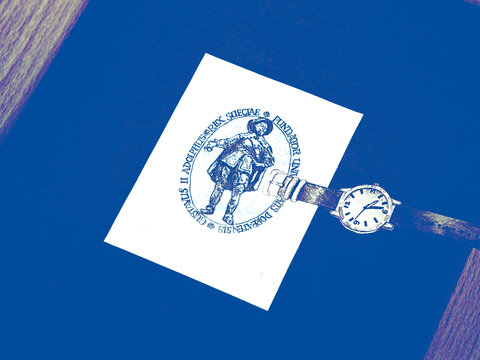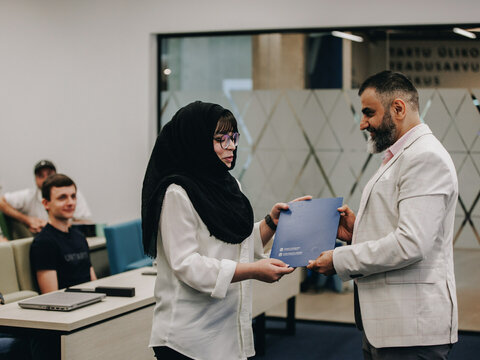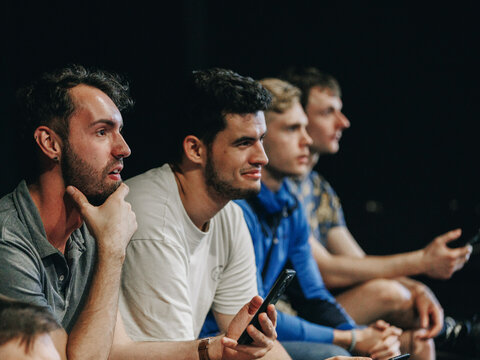Civic Competence in Creative Cities - How Digital Innovations Contribute to Durable Democracies
-
Credits
3 ECTS (78 hours)
Form of study
Partially web-based
Location
Other
Fee
700 EUR
Teachers
Mihkel Solvak
Svetlana Bogomolova
Toomas Hendrik Ilves
Bogdan Romanov
Vincentius Martinus Franciscus Homburg
David Dueñas Cid
Logan Emily Carmichael
Biao He
Stefan Dedovic
Art Alishani
Joep Crompvoets
Jan Kleiner
Svetlana Bogomolova
Toomas Hendrik Ilves
Bogdan Romanov
Vincentius Martinus Franciscus Homburg
David Dueñas Cid
Logan Emily Carmichael
Biao He
Stefan Dedovic
Art Alishani
Joep Crompvoets
Jan Kleiner
Study group
Political sciences and civics
Program language
English
Purpose:
This course will immerse participants in arguably one of the most advanced digital societies in the world and allow students to study real-world manifestations of the theoretical topic of 'digital-era governance'. Students will study real-world e-governance challenges (as faced by the City of Tartu) and provide recommendations in the form of visual language (graphic animations) and a short memo. The Summer School is supported by European Union's Horizon 2020 research and innovation programme project ECePS ERA Chair (ERA Chair of e-Governance and Digital Public Services; grant agreement No 857622). The school is partly funded by the Erasmus+ Blended Intensive Programme (BIP).
Target group:
Advanced BA or M level students with a social sciences or humanities background, knowledge of and demonstated quantitative and/or qualitative data gathering and analysis skills.
Outcome:
After having completed the course, participants will be able to:-explain core concepts and lines of reasoning of Digital Era Govenance and models of digital democracy;
-design and conduct research projects focusing on how citizens (in various roles) experience digital governance and digital democracy;
-report research findings using storytelling and audiovisual techniques.
Teachers:
Mihkel Solvak - Mihkel Solvak is an associate professor in technology studies at Johan Skytte Institute of Political Studies at University of Tartu in Estonia. His research focuses on the usability of machine learning in designing and building pro-active digital services that act as either decision support tools for civil servants or behavior predicting services to be used in prevention work. Svetlana Bogomolova - Lecturer, Department of media design, Pallas University of Applied Sciences, Tartu.
Toomas Hendrik Ilves - Visiting Professor of Democracy in Digital Age.
Bogdan Romanov - PhD candidate in the Johan Skytte Institute for Political Studies and a Junior Research Fellow in e-Governance at the University of Tartu.
Vincentius Martinus Franciscus Homburg - Vincent Homburg is the full Professor of e-Governance and the holder of the ERA Chair of e governance and digital public services at the University of Tartu.
David Dueñas Cid - Associate Professor and Director of the Public Sector Data-Driven Technologies (Pub-Tech) Research Center at Kozminsky University
Logan Emily Carmichael - PhD candidate in the Johan Skytte Institute for Political Studies and a Junior Research Fellow in e-Governance at the University of Tartu.
Biao He - PhD candidate in the Johan Skytte Institute for Political Studies and a Junior Research Fellow in e-Governance at the University of Tartu.
Stefan Dedovic - PhD candidate in the Johan Skytte Institute for Political Studies and a Junior Research Fellow in e-Governance at the University of Tartu.
Art Alishani - PhD candidate in the Johan Skytte Institute for Political Studies and a Junior Research Fellow in e-Governance at the University of Tartu.
Joep Crompvoets - Joep Crompvoets is full professor Information management in the Public Sector and senior researcher in thee domains: e-Government, Digital Government, Public Sector innovation, GIS, and Spatial Data Infrastructures.
Jan Kleiner - Dr. Jan Kleiner, associate professor of Political Science at Masaryk University, the Czech Republic. Main areas of research: cybersecurity, the relationship between a state and citizens in cyberspace, propaganda and information warfare.
Content:
| Topic | Credit | Lectors |
|---|---|---|
| 1. History and context of digitalisation in Estonia Meet Tartu City: how to make Tartu an even smarter city (City of Tartu) |
11 | Vincentius Martinus Franciscus Homburg |
| 2. Digital Era Governance Workshop on storytelling and how to present findings in creative ways Forerunners of Estonian digital transformation. Meetup and talk by President Toomas Henrik Ilves |
11 | Toomas Hendrik Ilves, Joep Crompvoets |
| 3. How to analyse qualitative data Diversity challenges in electronic services delivery Digital citizen-state relations |
11 | Vincentius Martinus Franciscus Homburg, Biao He, Art Alishani |
| 4. The impacts of e-voting in Estonia Service security – Estonian example International experiences with e-voting in non-democratic contexts Creative ways of storytelling |
11 | Mihkel Solvak, Svetlana Bogomolova, Bogdan Romanov, Logan Emily Carmichael |
| 5. Field trip to Tallinn (E-Estonia briefing centre, Ministry of Economic Affairs and Communications) | 12 | Vincentius Martinus Franciscus Homburg |
| 6. AI in decision-making and governance Digital service delivery in Europe Presentation on preliminary findings by the student groups |
11 | Mihkel Solvak, Stefan Dedovic, Jan Kleiner |
| 7. Electronic services and trust Impact and valorisation of research Final presentations |
11 | David Dueñas Cid |
Price info:
The course is free of charge of participants of the BIP program or other scholarship holders.
Location info:
Harju maakond
Learning environment:
Studies and teaching takes place in appropriate classrooms, which have the required teaching equipment and meet the health and safety requirements.
Schedule and further information:
The Summer Course will introduce participants to the theme of Digital Era Governance and Digital Democratic Innovations, with a special focus on how digital innovations can be used to tap into and unlock civic competence in processes of public governance. During the in-person part of the Summer Course, participants will learn about the basics of theoretical frameworks and familiarize themselves with public governance themes and democracy challenges that exist in the City of Tartu and carry out small research projects in relation to the themes and challenges. Guest lectures and presentations will allow participants to get up to date with state-of-the-art research initiatives and outcomes and gather and analyze information about (digital) governance and democracy challenges in Tartu. There will also be site visits (including a one-day trip to Tallinn), a Meet & Greet with former President Toomas Hendrik Ilves. Throughout the Summer Course, participants will apply storytelling and audiovisual techniques to present their research findings.
Requirements to complete:
Evaluation of animated video (80%) and memo (20%) by team and City of Tartu representatives.
Outcome method:
differentiated (A, B, C, D, E, F, not present)
Grading method:
The assessment method consist of the following:1) Animated presentation (80%, minimum score E to pass the course)
2) Memo with recommendations (20%, minimum score E to pass the course)
Grading criteria:
Animated presentation will be evaluated according to the following criteria:
F – no animation submitted
E – static and PowerPoint-like presentation of research findings, no storytelling techniques used
D – static presentation of research findings with some storytelling techniques being used
C – adequate animation with some storytelling techniques being used;
B – persuasive and compelling animation with storytelling techniques
A – persuasive and compelling animation using storytelling techniques, rich and creative animation of challenge and its solutions
Memo with recommendations will be evaluated according to the following criteria:
F – no submitted
E –no or few (poorly drafted) recommendations
D - few (poorly drafted) recommendations, addressing specific (policy) actors
C – specific recommendations addressing specific (policy) actors and time frames;
B –specific recommendations addressing specific (policy) actors and time frames but lacking focus on impact and relevance
A –specific impactful and feasible recommendations addressing specific policy actors, resources, time frames
Document to be issued:
Certificate of completion
Tax refund:
No
Additional information:
Kerli Klock, kerli.klock@ut.ee, +372 +372 737 5937
Program code:
SVJS.TK.069
General contact:
Similar lifelong learning courses
Time of occurrence:
02.09.2024
-
28.09.2024
Credits: 2 ECTS (52 hours)
Form of study: Entirely web-based
Language: English
Time of occurrence:
05.09.2024
-
14.01.2025
Credits: 4 ECTS (104 hours)
Form of study: Entirely web-based
Language: Estonian
Time of occurrence:
02.09.2024
-
20.06.2025
Credits: 16 ECTS (416 hours)
Form of study: Partially web-based
Language: Estonian
Time of occurrence:
02.09.2024
-
31.01.2025
Credits: 18 ECTS (468 hours)
Form of study: Entirely web-based
Language: English
Time of occurrence:
02.09.2024
-
30.06.2025
Credits: 24 ECTS (624 hours)
Form of study: Partially web-based
Language: Estonian





